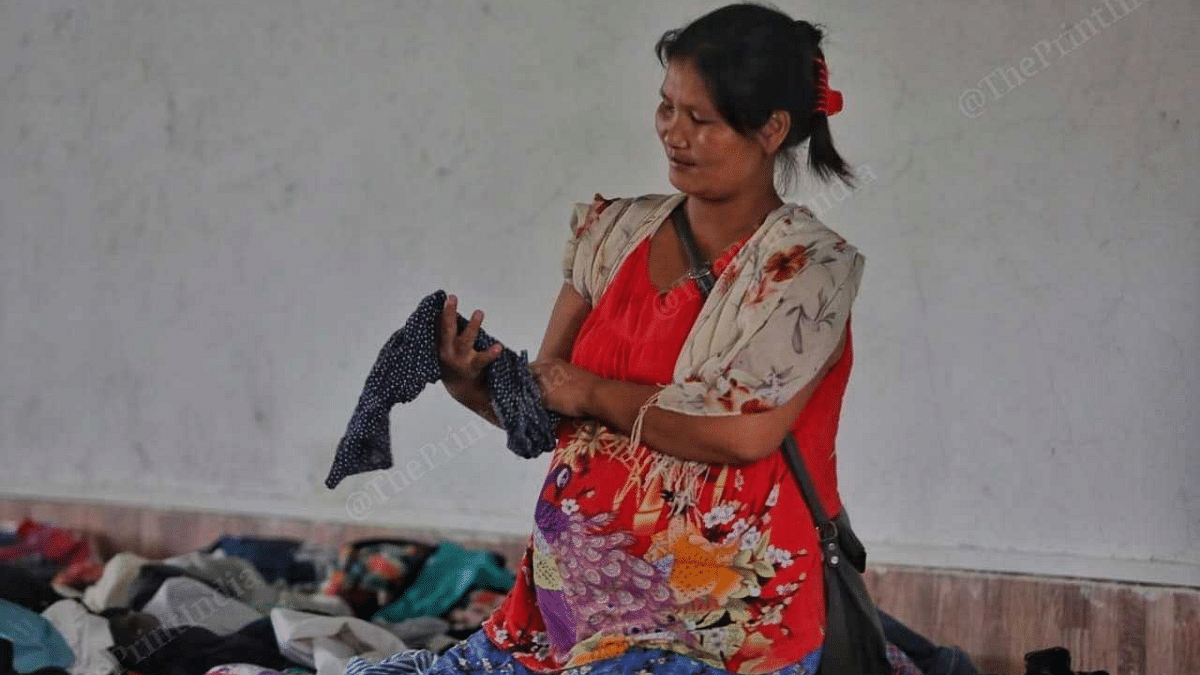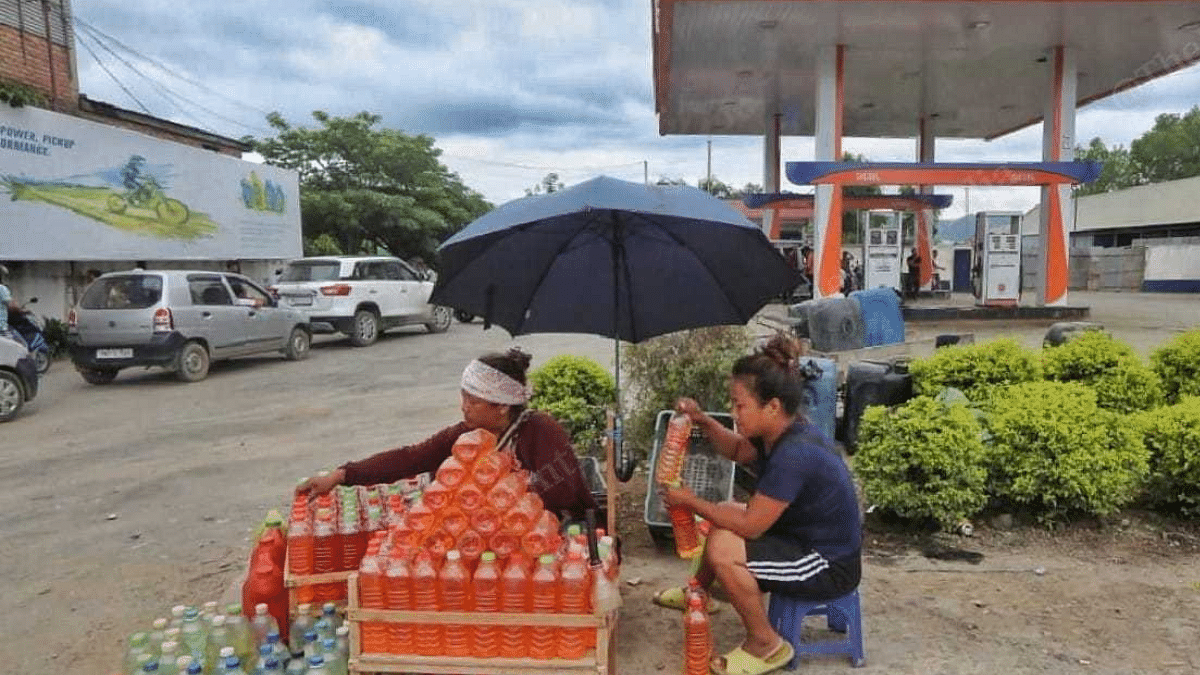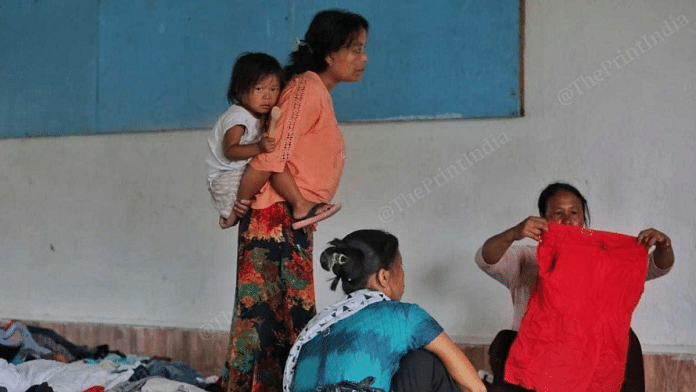Churachandpur: At a relief centre in Kuki-dominated Churachandpur, Thethiem, who is seven months pregnant, rummages through a pile of old, worn-out clothes scattered inside a hall. She has been here since her home in Sugnu, Kakching district, was allegedly burnt to ashes on 27 May, and it has been hard.
Struggling to arrange essential medicines, Thethiem, who goes by a single name, visits an aid centre run by the civil society group Young Vaiphei Association (YVA) every other day, hoping for fresh supplies. But she comes back disappointed.
Food at the relief camp is limited to basic rice and lentils, twice a day. With this meagre nutrition and lack of medicines, she fears for her baby’s well-being and prays that the birth is safe nevertheless.

Thethiem is not alone.
The 105 relief camps in Churachandpur, housing several displaced people, are allegedly facing severe challenges in obtaining rations from the Public Distribution System (PDS) and relief from the state, with a similar story said to be playing out at camps in Tengnoupal, another hill district.
The camps can only afford to arrange two meals a day, making food a luxury for their residents.
Sources from the security establishment told ThePrint that the Meiteis in Imphal valley were “blocking the rations meant for Kuki areas” and exacerbating the situation. The blockade was confirmed to this reporter by Meiteis in Imphal, who alleged the security forces were biased towards the Kukis.
According to the security sources, lines of communication to Tengnoupal, Chandel, Sajik Tampak and Churachandpur have remained blocked since 3 May, interrupting the flow of all goods, including essential items for the population in the hills, from or passing through Imphal. The hill areas, it is learnt, have been making do with the stocks in Food Corporation of India (FCI) reserves, and the little that comes in through alternative routes.
The ongoing ethnic clashes between the tribal Kukis and non-tribal Meiteis erupted on 3 May, following a ‘Tribal Solidarity March’ taken out to oppose the demand for inclusion of Meiteis in the Scheduled Tribe (ST) category. According to police data, the violence has so far claimed over 157 lives and displaced more than 50,000.
“They (Meiteis) are not letting any rations pass through Imphal. If they find that any truck is going towards the hill, they loot the rations and set the vehicle afire,” a source in the security establishment told ThePrint.
There are also allegations of discriminatory practices towards the Kuki community — which the administration denies.
“There is discrimination in rations that are being sent, which is further fuelling communal disharmony. Tengnoupal district is entitled to 2,100 quintals of rations, of which 1,400 quintals were allowed that went to (areas dominated by) other communities (the Nagas and Marrings). But 700 quintals that were meant for the Kukis were not allowed,” the source claimed.
“Essential items like baby food, medicines and sanitary items have run out everywhere. No fuel or LPG supply has been allowed to go from Imphal to targeted areas,” the source added.
In stark contrast, relief camps in Imphal valley set up for the Meitei community receive regular supplies of foodgrains and medicines through NH 37, which comes through Silchar in Assam and is one of the state’s two transport lifelines (the other is NH 2, which comes through Dimapur), sources in the security establishment said. During a visit by ThePrint to a Meitei camp in Akampat and a Kuki camp in Churachandpur on 10 July, the disparity was evident.
While the Meitei camp had sufficient food, medical facilities, and access to education for their children, and other amenities, the Kuki camp struggled with basic necessities.
Schools have reopened in the Valley area, but all school buildings in the hill region have been turned into relief camps, and classes remain suspended.
The scarcity in Churachandpur and Tengnoupal has also triggered a steep rise in the prices of essential commodities. A gas cylinder, priced before the clashes at Rs 1,800, now costs Rs 2,500. Rice prices have surged, while petrol is being sold on the black market, local residents told ThePrint.
The situation has also led to long queues outside ATMs as people struggle to access cash.
Speaking to ThePrint, Churachandpur Superintendent of Police (SP) Karthik Malladi acknowledged the shortage of food. He, however, said that the supply is being maintained by the district collector of the area, who is buying the supplies.
When ThePrint reached Churachandpur District Collector Tarul Kumar for comment, he said there is sufficient rice stocked in the FCI godown, from where the PDS rations are being supplied, and this has nothing to do with the state.
“We have sufficient stock in the FCI godown and we are ensuring adequate supply to the people. Of course there are issues of transportation of other essentials, and there is inflation because of the law and order situation, but we are doing our best,” he added.
Also Read: ‘Gunfire, bombs every night’ — caught between Meiteis & Kukis, Muslim village wants peace
Help from neighbours
With residents facing an acute shortage of food and essential items, organisations such as the YVA are doing their best to provide some support. Even so, the lack of governance and facilities in the hills have compounded the challenges for the displaced population, people living in the camps and the security forces told ThePrint.
Romeo (goes by a single name), a representative of the welfare groups of Kukis in Pallel, alleged that not a single grain of rice had reached them since the violence began on 3 May.
“The hills are not administered, there is no governance, no facilities. We do not have a government that we can trust to take care of us or be fair. Not even a single rice grain has reached us since the conflict began. The state and the perpetrators just want to see us die,” he said.
“The daily wage earners are dying and are at the mercy of the people around them, who are helping them,” Romeo added.
David Vaiphei, co-convener of YVA relief committee, said they were serving around eight camps that have 5,000 people.
“There are around 200 sacks of rice, each weighing 45 kg, that they are able to manage, which are meant for a month but don’t last a month. But we are managing somehow,” he said.
According to SP Malladi, it is not just the grains, “but police documents are also being blocked from Moiran (valley area) by the Meiteis”.
“Even if we need any files from the headquarters in Imphal, we use the Muslims as human couriers and conceal the files and bring. If any of the Meiteis sees those files with Churachandpur written on them, they would just burn them,” he told ThePrint.
According to another source in the security establishment, while Churachandpur is still able to manage rations through Mizoram, Tengnoupal isn’t. Its only lifeline is from the Ukhrul side, which is a hilly and washed-out narrow road, causing significant delays in the delivery of essential items.
“Discrimination and the illegal economic blockade by Meiteis and the inability of the administration to intervene have made people lose faith in them,” the source quoted above said.
To survive, the residents are relying on the assistance of neighbouring communities.
“Help is also being received from the Nagas in the area. Although they have not said anything overtly, but are helping both communities in every way possible,” Romeo said.
Also Read: In Imphal school, Meitei kids who fled violence get by with a little help from new friends
Inflated prices, alternative professions
The skyrocketing prices of essentials have compelled the affected people in Churachandpur to resort to alternative means of earning a livelihood. Daily wage labourers and weavers are now selling loose petrol in bottles outside petrol pumps, which are witnessing long queues.

“People are being forced to procure essential items though non-transparent deals, smuggle [them] in from Myanmar or procure from Mizoram and Nagaland,” the source quoted above said.
The situation has led to significant price hikes — petrol, which was priced at Rs 70 per litre before the clashes, is being sold between Rs 120 and Rs 150 per 750 ml bottle, and a 45-kg sack of rice, once priced Rs 1,800, now costs Rs 3,000, the sellers told ThePrint.
Vunzboi, a weaver who is now selling petrol in Churachandpur, said, “We are weavers and daily wage labourers who have now taken up this profession of selling petrol. We get petrol from a dealer, who in turn gets it from Mizoram and sells it to us for Rs 100 per bottle. We then sell it ahead for Rs 120-Rs 150. Every day the rate varies.”
“We are surviving on donations and the money we have collected together,” said George, a resident of Kanaan village in Churachandpur. “But with no income, for how long will we be able to shell out money to buy food?”
(Edited by Richa Mishra)



